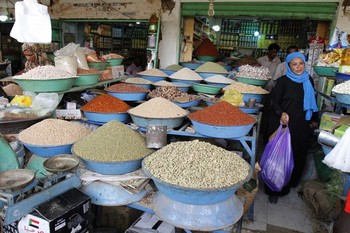Customers in Khartoum complain about rising prices
July 30, 2013 (KHARTOUM) – Markets in Sudan’s capital of Khartoum have witnessed a significant increase in the prices of clothing, accessories, toys and perfumes just a week before Eid Al-fitr (Religious holiday celebrated by Muslims worldwide that marks the end of Ramadan, the Islamic holy month of fasting).

Prices of clothing have risen by 150% compared to last year amid predictions that a further hike of 25% is forthcoming due to increase in government toll on imported products.
Saad al-Din Ahmed, told Sudan Tribune during a tour in one of Khartoum’s markets that he purchased skirts and pants for his two daughters at the price of 450 pounds, adding that buying clothes for the kids in Eid Al-fitr is indispensable despite high prices. He seemed to be worried about prices of items such as candies and cookies.
Traders at a pastries shop told Sudan Tribune that price of a kilogram of Kunafah (an Arab cheese pastry soaked in sweet sugar-based syrup ) has reached 22 pounds attributing the increase to the rise of flour price.
A senior official in the Central Bureau of Statistics (CBS) projected that the inflation rate would increase significantly in August but said that it should return to its normal level following Eid Al-fitr.
A senior official in the chamber of industry predicted that commodity prices will increase by 25% prior to Eid Al-fitr due to additional fees imposed by the government on imported goods as well as the increase in foreign exchange rates.
The popular markets in Khartoum looked crowded with shoppers who complained about high prices and accused the government of deregulating prices in a way that is not commensurate with a daily average income of $1.
Earlier this month, Sudan’s ministry of finance declared that it has embarked on the final arrangements for increasing the minimum wage.
But a worker told Sudan Tribune that he would receive 60 pound SDG increase which doesn’t suffice to buy a single meal.
The current minimum monthly wage is 425 pounds ($96 based on official exchange rate).
Prices have also risen in the furniture market leading to an jump in the price of a Chinese-made bedroom to 9.000 pounds compared to 6.000 before.
A trader at the furniture market told Sudan Tribune that government fees have increased significantly which led to a decrease in purchasing power, saying “I won’t sell until the dollar price is settled”.
Sudan’s economy was hit hard since the southern part of the country declared independence in July 2011, taking with it about 75% of the country’s oil output.
The last poverty survey which was conducted in 2009, prior to the secession of South Sudan, revealed that 46% of the population in the north lives below the poverty line including 57.6% in rural areas.
Sudan’s ministry of social welfare had previously estimated that there are 2 million poor families, including 300,000 destitute families who cannot afford to buy their daily food.
The Sudanese government spends 80% of its budget on the army and other security forces, while less than %5 is spend on health and education.
(ST)
